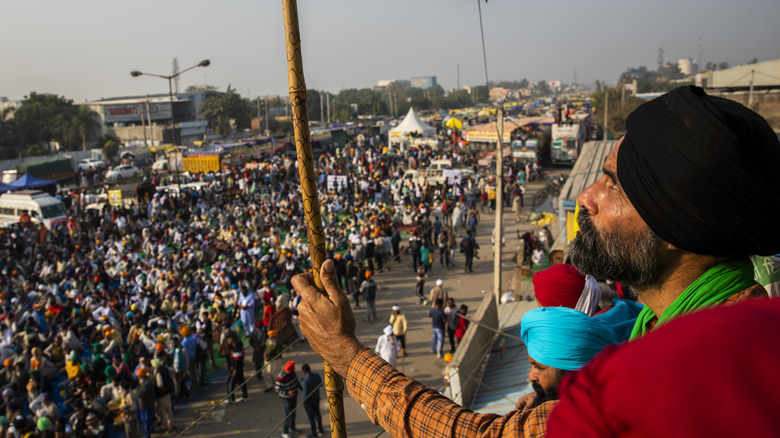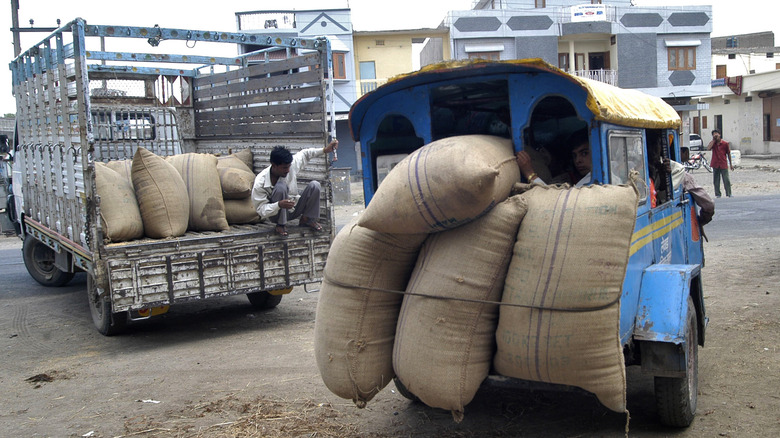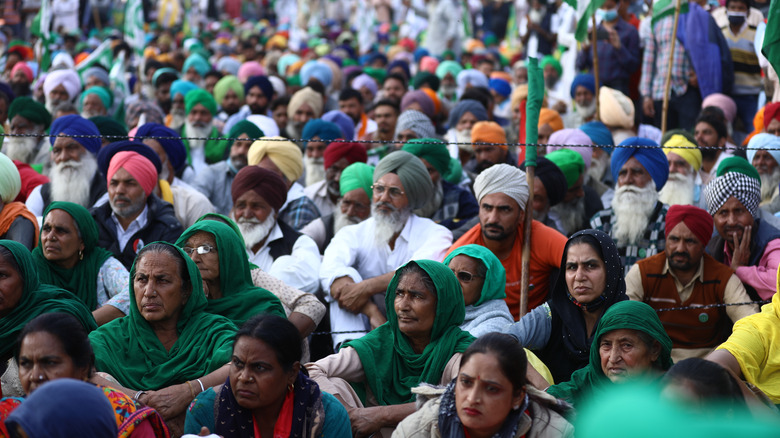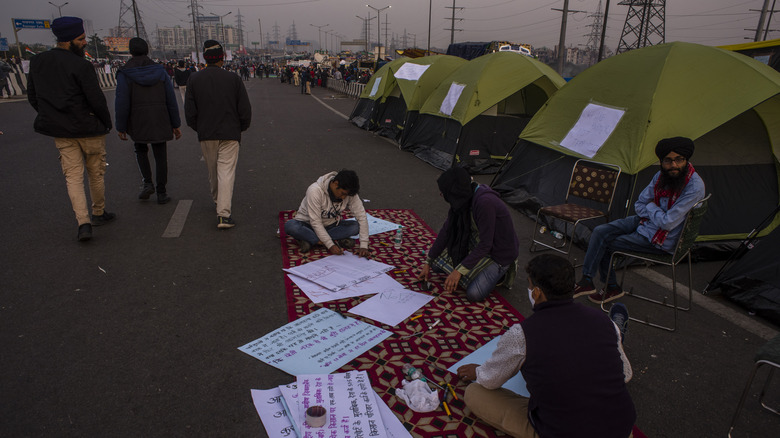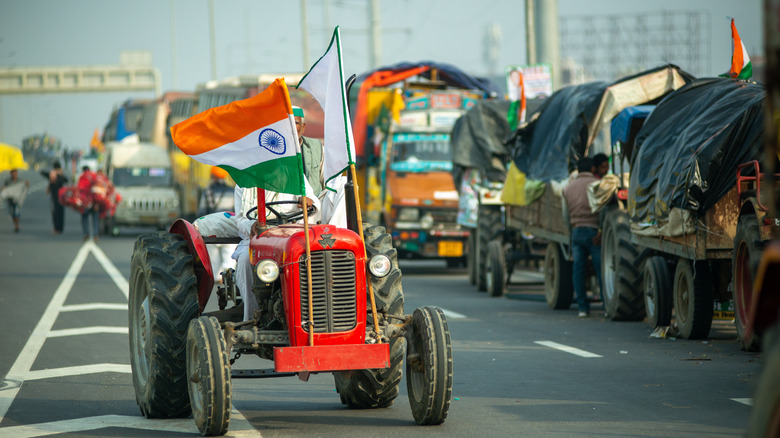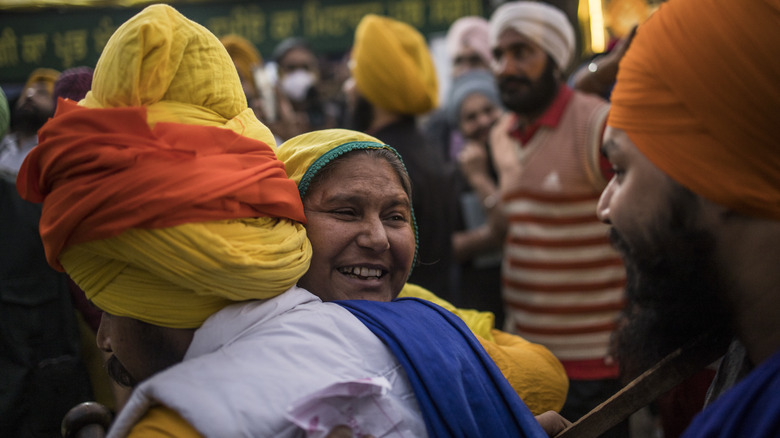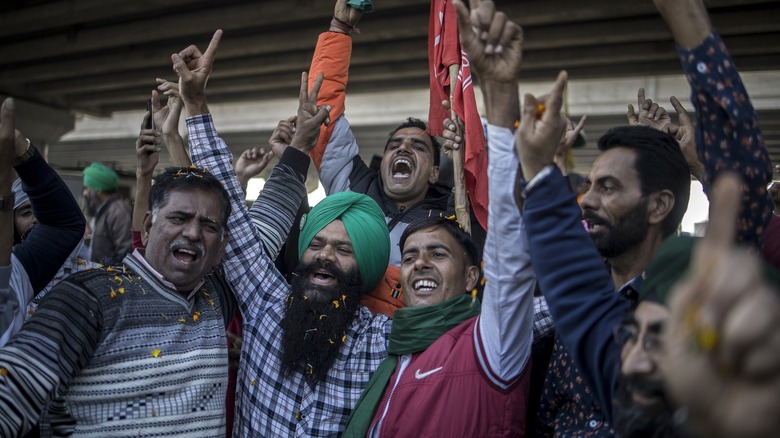What Really Happened During The India Farmers' Protest?
Between August of 2020 and December of 2021, Indian farmers rose up against a series of three laws passed by Prime Minister Modi's government that were collectively known as the Farm Laws. These three laws were passed ostensibly to prop up the country's ailing agricultural sector, reports The New York Times. Farmers, however, worried about their livelihoods and banded together in an unprecedented fashion, coalescing into a massive collective strike.
During the year of the India Farmers' Protest, few could predict what was going to happen. The overwhelmingly negative response to the Farm Laws and march to Delhi turned out to be just the beginning as farmers in India stood together and called for the laws which they referred to as "black laws" be repealed. And the farmers weren't alone in their endeavor. Their protests ended up uniting with that of the trade unions to create one of the biggest strikes in history. Throughout the farmers' protests, one of the main slogans was "Kisan Mazdoor Ekta Zindabad," or "Long Live Farmer-Worker Unity."
Despite the COVID-19 pandemic, farmers maintained their position and continued their protests. "If we go back now, no one is going to care for us and the government will continue with the three laws in place. And if these laws continue, our future is over, said Balbir Singh Rajewal, "so, this is a life and death situation for us," per NewsLaundry.
The Farm Laws
In India, agriculture is a big part of the lives of millions of people. And although agriculture amounts to only 20% of the entire national income, IBEF reports that almost 60% of working people in India are in the agricultural industry. Many farmers in India live in the state of Punjab, known as "India's breadbasket," and although Sikhs (a religious minority in the largely Hindu country) comprise only around 2% of India's total population, they're the majority population and agricultural community in Punjab. Additionally, according to The Print, almost "75% of the full-time workers on Indian farms are women."
In September 2020, the livelihoods of millions of farmers were threatened as the Indian Parliament passed the sweeping Farm Laws. Civil Eats notes that the government used COVID-19 as an excuse to push the laws through without any consultations.
Although Prime Minister Narendra Modi claimed that the legislation gave farmers freedom and choice, this notion was resoundingly rejected by various congressional members, reports The Hindustan Times.
Before the Farm Laws were passed, farmers in India used state-backed agricultural markets known as mandis to sell their crops, which provided a "regulated market space," according to Akademi Magazine. In Indian states where similar reforms were attempted, like Bihar, The Conversation notes that farmers were paid less than the minimum price for their goods.
The biggest strike in history
After the passage of the Farm Laws, farmers in Punjab and Haryana (a neighboring state) immediately voiced their objections and led numerous strikes and protests, calling for the repeal of the laws. This included a three-day protest in Punjab known as a "rail roki" that sought to disrupt train services, according to The Indian Express.
The farmers' protests also coincided with a general strike organized by ten trade unions. In support of one another, the charter of demands issued by the trade unions included a repeal of the Farm Laws, writes Times of India. Farmers also joined the two-day nationwide general strike on November 26 and 27, in which over 250 million workers in India participated. Slate described it as "possibly the biggest protest in world history." Five states including Assam, Kerala, and Telangana "saw a complete shutdown," according to NewsClick.
Following the general strike, farmers and agricultural laborers marched to Delhi in late November to show their opposition to the Farm Laws, led by a "united front of over 40 Indian farmers unions" known as Samyukta Kisan Morcha (SKM), per IATP. Known as the Delhi Chalo, or "onwards to Delhi" call, The Guardian writes that over 300,000 farmers marched across North India from several states, including Uttar Pradesh, Madhya Pradesh, and Rajasthan, towards Delhi to protest. The farmers were also joined in their protests by laborers and people from working-class communities, according to The Caravan.
Months of protest
The farmers and agricultural laborers that marched to Delhi stayed and protested for a complete repeal of the Farm Laws for over a year. The sit-in protests around Delhi were so large "they began to look like distinct townships," each covering an area of up to 9 miles and blocking the highways that led into Delhi.
According to The Conversation, the number of protesters surrounding Delhi ranged from 300,000 during the first week to a peak of nearly a million in January, when farmers arrived "from across the country and drove their tractors on the roads." However, the numbers fluctuated as farmers split their time between home and the protest, but even at a single camp, there were around 10,000 people, per CNN.
Throughout the protest, Indian farmers and agricultural laborers were also violently targeted by police forces as well as government officials. Reuters reports that in Uttar Pradesh, a car-ramming at a protest killed four people, and is now known as the "Lakhimpur Kheri incident". Activist Nodeep Kaur, for instance, was arrested and held in custody without bail for over a month. Scroll.in writes that Kaur was also reportedly tortured and sexually assaulted in police custody.
It's estimated that nearly 700 farmers died during the protest, some due to cold weather exposure or road accidents, others due to suicide, according to Al Jazeera. However, the exact number of protester deaths is unknown.
Repeal of the Farm Laws
Throughout the protests, farm unions continued to have rounds of talks with the government but the Modi administration refused to repeal the laws. The best the government claimed they could do, according to The Print, was suspend the laws for 12-18 months. But the farmers knew that this wasn't enough and continued to maintain their protests. Meanwhile, The Wire notes that Prime Minister Modi referred to the protestors as "andolanjeevis [those who live off protests without reason] and parjeevis [parasites]."
And then, after over a year of protests, Prime Minister Modi suddenly announced that he'd decided to repeal the Farm Laws on November 19, 2021. According to DW, Modi claimed that the constitutional process would start by the end of November and urged the farmers to "now return to your home." However, union leader Rakesh Tikait maintained that they wouldn't leave until the laws were "formally repealed by parliament."
On November 29, the Indian Parliament passed a bill that repealed the three Farm Laws, passing "in record time in both houses of parliament," per NDTV. Farmers were also informed that the criminal cases filed against the protesters were being withdrawn, which was also a demand of the farmers.
During the protests, farmers had also called for the government to introduce minimum support prices for all crops, and although this wasn't accomplished with the protest, Al Jazeera writes that the protests were ended after the government assured the farmers' unions that this would be considered.
Resolution of the protests
Although farmers in India were successful in getting the Farm Laws repealed, SKM wrote to Prime Minister Modi and urged him that despite the resolution of the protests, it was still important to continue discussions with the farmers' unions on a number of issues. Writing, "You may be fully aware that the repeal of the three black laws is not the only demand of this movement. From the very beginning of the talks with the government (last year), the [SKM] had raised three additional demands," per The Times of India.
By the end of the protest, farmers were also calling for the arrest of Ajay Kumar Mishra, India's junior minister for home affairs, for his son's involvement in the Lakhimpur Kheri incident which, according to Civil Eats, was proven to be a "planned conspiracy" to run over farmers.
As of January 2021, the Modi administration is still considering some of the additional demands. Many farm union leaders from SKM have "warned that protests will resume" if minimum support prices aren't made a legal right, according to Civil Eats.
However, farmers were jubilant upon hearing of the official repeal of the Farm Laws, Al Jazeera reports. Swaran Kaur, a 65-year-old farmer from Punjab's Patiala district stated that "We are happy that the farm laws have been repealed. But more than that, the biggest happiness is that we have beaten Modi because he was considered someone who would not go back on his word."
India going forward
After a year of protests, farmers in India were able to breathe a momentary sigh of relief as the three Farm Bills were repealed. Yes! Magazine characterized the victory of the farmers was a "direct blow to WTO, IMF, and World Bank policies, and to the BJP's [Bharatiya Janata Party's] privatization agenda." As a result, the victory of India's farmers cannot be understated.
The Guardian writes that the farmers' victory may also have an electoral impact. The state of Uttar Pradesh, where the Lakhimpur Kheri incident occurred, is governed by Modi's far-right, Hindu nationalist BJP as of January 2022. But with elections in February-March 2022, the BJP may end up paying a "heavy political price in the state for the farm laws."
Farmers in India also received a great deal of solidarity from farmers' unions around the world, who recognized what farmers in India were going through. Common Dreams reports that 87 farmers' unions in the United States signed a statement of solidarity with Indian farmers in February 2021, stating that "what the Indian farmers are enduring now happened in the U.S. almost four decades ago." The Delano Grape Strike and the Salad Bowl Strike also represent similar organizing efforts, and although those farmworkers in California weren't protesting deregulation, every one of these agricultural protest movements occurred in response to decisions that were made for farmworkers without ever consulting the farmworkers.
